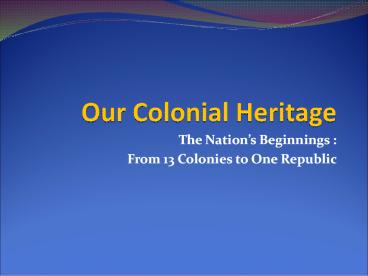Our Colonial Heritage PowerPoint PPT Presentation
Title: Our Colonial Heritage
1
Our Colonial Heritage
- The Nations Beginnings
- From 13 Colonies to One Republic
2
Christopher Columbus
- Bell Ringer!
- In your opinion, was Christopher Columbus a hero
or a villain? Explain.
3
Early Colonial Claims
- 1492 Christopher Columbus voyage led to European
settlement - Spanish Conquistadors were followed by Portugal,
Holland, England, France, and even Russia (1741) - They came for God, Gold, and Glory!
- St. Augustine, FL (Spain, 1565) oldest city in
U.S.
4
The Columbian Exchange
- Columbus Legacy is a Mixture of Pros and Cons.
- New Animals Introduced (Horses, Cattle, Hogs,
Sheep, etc.) - New Foods Introduced in Europe (Corn, Potatoes,
Tomatoes, etc.) - Measles, Mumps, Typhus, Smallpox (Diseases) -
Maybe 90 of Native Americans perished. - African slavery introduced to provide labor in
New World by Spanish, Portuguese, Dutch, and
later the English would dominate the trade.
5
The Middle Passage
- By 1650 an estimated 300,000 African slaves were
in the Spanish Caribbean working gold and silver
mines and plantations. - The Portuguese in Brazil dominated the European
sugar trade and more than 40 of 12 million
slaves taken from Africa were sent to S. America. - The English largest exporters of slaves after
1690 (1.7 million in just over 100 years) and
only 400,000 actually wound up in the U.S. - The Middle Passage was the middle leg of the
Atlantic trade triangle.
6
Jamestown, VA (1607)
- This monument is dedicated to Captain John Smith
who founded the colony at Jamestown, VA in May
1607. It was the first permanent English
settlement. He was the colonys first governor.
7
Jamestowns Harsh Environment
- Insect-infested Swamp
- The Chesapeake Bay
8
400th Anniversary of Jamestown
- May 13, 2007 was the colonies 400th Anniversary.
- Current archeological dig at the original site
- Dutch pottery dating back to the late 1500s
9
Then and Now
- A model of early Jamestown
- What is left today
10
Who is this?
11
Jamestown Prospers
- Tobacco (1612) was the number one export.
- It was governed by a partnership between King
James Is appointed Royal Governor and the House
of Burgesses (an elected legislature). - After the Starving Time (Winter of 1610-11) the
colony experienced great growth.
12
Exit Slip 4 Points Possible!
- God
- Gold
- Glory
- If Columbus really didnt discover America, why
were his voyages to the New World so important
with regard to World History?
13
The 13 Colonies
- New England Pilgrims (1620) and later Puritans
settled Massachusetts (1630) for religious
freedom - The Mayflower Compact (1620) provided a model
for self-government (Social Contract) - Timber, Fishing, Ship-building
- Middle Colonies Known for religious tolerance
and exported wheat as economy was based on
farming. - Southern Colonies Slavery was more important
here because cash crops like tobacco, indigo, and
rice are more labor intensive.
14
Slavery in the New World
- 1619 First African slaves arrive in Jamestown
- By 1808, 5 of the 12 - 15 Million Africans would
end up in North America - The Middle Passage was the brutal leg of the
Triangle Trade that brought enslaved Africans to
the New World - A picture of a slave ship
15
Colonial Governments
- Each had a legislature and usually it was
bicameral. - In Royal Colonies, Upper House chosen by Crown
and Lower House by the People. - Self-governing Colonies both houses chosen by the
people. - Judges were appointed by the King in Royal
Colonies and elected by the people in
Self-governing Colonies. - Suffrage was not universal. Only white men, 21
years of age and that owned land could vote.
16
Major Influences on American Political Thought
(See Page 10)
- The Roman Republic (509 27 BC) Civic Virtue
and the Common Good it was representative. - English Tradition Magna Carta (1215),
Parliament (1258), English Bill of Rights (1689),
Common Law - Political Philosophers John Lockes Two
Treatises on Government (1690) - Natural Rights
Philosophy, Separation of Powers, Social Contract
Theory - Judeo-Christian Roots Ten Commandments Jesus
- Colonial Heritage Suffrage, Tradition, Checks
and Balances, Natural Rights, Jury Trial
17
The Colonies and Britain
- 1607-1754 Englands policy was salutary
neglect toward the colonies. - The traditions of limited monarchy and
self-government in the colonies benefited both
sides (!). - Britain France fought a series of costly wars
between 1689 - 1763 relationship changed. - King George III Tyrant!
18
Fort Boonesboro, KYFounded by Daniel Boone and
others in April 1775One source of conflict was
that colonists wanted to move west!Here are two
rare photos of pioneer children at work in their
cottage.
19
Exit Slip Colonial Governments
- Who was the author of the Natural Rights
Philosophy? - a. Benjamin Franklin b. John Locke c.
Thomas Hobbes - The Republican form of government was first used
in ancient - a. Babylon b. Greece c. Rome
- Salutary neglect describes the early relationship
between - a. England/ 13 Colonies b. Colonists/ Native
Americans - c. England/ France
- In ___________ colonies, both houses of the
legislature were chosen by the people. - a. royal b. self-governing c. all
20
The French-Indian War (1754-1763)
- What was another name for the French-Indian War?
- What side did the Native Americans take? The
colonists? - Who won?
- What did the winners take from the losers?
- What new problems resulted for the colonists at
the end of the war?
Simon Kenton

